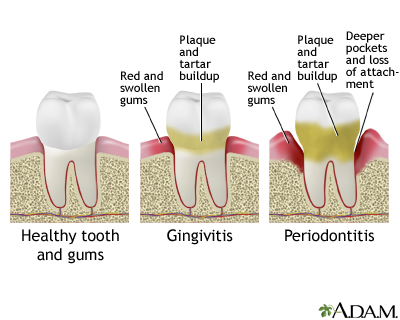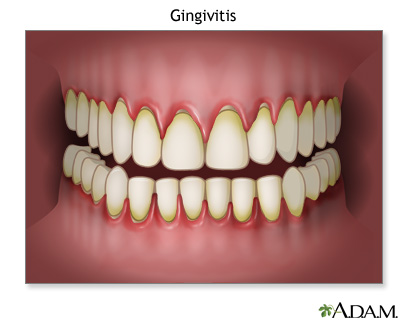Health Topics
Tooth decay and gum disease are caused by plaque, a sticky combination of bacteria and food. Plaque begins to build up on teeth within a few minutes after eating. If teeth are not cleaned well each day, plaque will lead to tooth decay or gum disease. If you do not remove plaque, it turns into a hard deposit called tartar that becomes trapped at the base of the tooth. Plaque and tartar irritate and inflame the gums. Bacteria and the body's inflammatory response to it cause the gums to become:
- Infected
- Swollen
- Tender
By taking good care of your teeth and gums, you can help prevent problems such as tooth decay (caries) and gum disease (gingivitis or periodontitis). You should also teach your children how to brush and floss from an early age to help them protect their teeth.
Plaque and tartar lead to a number of problems:
- Cavities, or tooth decay are holes in the tooth's structure.
- Gingivitis is red, swollen, inflamed, and bleeding gums.
- Periodontitis is a gum infection that damages the supporting structures of the teeth, such as the gums, ligaments, and bone, and often leads to tooth loss.
- Bad breath (halitosis).
- Abscesses, pain, inability to use your teeth.
- Other health problems outside the mouth, ranging from preterm labor to heart disease.

Information
HOW TO TAKE CARE OF YOUR TEETH
Healthy teeth are clean and have no cavities. Healthy gums are pink and firm, and do not bleed. To maintain healthy teeth and gums, follow these steps:
- Floss at least once per day. It is best to floss after brushing. Flossing removes plaque that is left behind after brushing from between the teeth and on the gums.
- Brush your teeth twice a day with a soft-bristled toothbrush. Brush for at least 2 minutes each time.
- Use fluoride toothpaste. The fluoride helps strengthen tooth enamel and helps prevent tooth decay.
- Replace your toothbrush every 3 to 4 months or sooner if needed. A worn-out toothbrush will not clean your teeth as well. If you use an electric toothbrush, change heads every 3 to 4 months as well.
- Eat a healthy diet. You are less likely to get gum disease if you eat healthy foods.
- Avoid sweets and sweetened drinks. Eating and drinking a lot of sweets increases your risk of cavities. If you do eat or drink sweets, brush your teeth soon after.
- Do not smoke. Smokers have more teeth and gum problems than non-smokers.
- Keep dentures, retainers, and other appliances clean. This includes brushing them regularly. You may also need to soak them in a cleansing solution.
- Schedule regular checkups with your dentist. Many dentists recommend having the teeth professionally cleaned every 6 months for optimal oral health. Seeing the dentist every 3 to 4 months may be needed if your gums become unhealthy.
Regular teeth cleaning by a dentist or dental hygienist removes plaque that may develop, even with careful brushing and flossing. This is very important for getting at areas that are hard to reach on your own. Professional cleaning includes scaling and polishing. This procedure uses instruments to loosen and remove deposits from the teeth. Routine exams may include dental x-rays. Your dentist can catch problems early, so they do not become more serious and expensive to fix.
Ask your dentist or dental hygienist:
- What kind of toothbrush you should use, and how to brush your teeth well. Ask if an electric toothbrush is right for you. Electric toothbrushes have been shown to clean teeth better than manual toothbrushes. They often also have a timer to let you know when you have reached the 2 minute mark.
- How to properly floss your teeth. Overly vigorous or improper flossing may injure the gums.
- Whether you should use any special appliances or tools, such as water irrigation. This may sometimes help supplement (but not replace) brushing and flossing.
- Whether you could benefit from particular toothpastes or mouth rinses. In some cases, over-the-counter pastes and rinses may be doing you more harm than good, depending on your condition.
WHEN TO CONTACT THE DENTIST
Contact your dentist if you have symptoms of a cavity that include:
- Pain in the tooth that occurs for no reason or is caused by food, beverages, brushing or flossing
- Sensitivity to hot or cold foods or drinks
Get early treatment for gum disease. Contact your dentist if you have symptoms of gum disease that include:
- Red or swollen gums
- Bleeding in the gums when you brush your teeth
- Bad breath
- Loose teeth
- Drifting teeth

Alternative Names
Teeth - caring for; Oral hygiene; Dental hygiene
References
Chow AW. Infections of the oral cavity, neck, and head. In: Bennett JE, Dolin R, Blaser MJ, eds. Mandell, Douglas, and Bennett's Principles and Practice of Infectious Diseases. 9th ed. Philadelphia, PA: Elsevier; 2020:chap 64.
Stefanac SJ. Developing the treatment plan. In: Stefanac SJ, Nesbit SP, eds. Diagnosis and Treatment Planning in Dentistry. 4th ed. St Louis, MO: Elsevier; 2024:chap 5.
Teughels W, Feres MF, Ganesan SM, Gidley MD, Hernandez-Kapila YL, Jakubovics N. Biofilm and periodontal microbiology. In: Newman MG, Klokkevold PR, Elangovan S, Hernandez-Kapila YL, eds. Newman and Carranza's Clinical Periodontology and Implantology. 14th ed. St Louis, MO: Elsevier; 2023:chap 10.
Review Date 3/31/2024
Updated by: Michael Kapner, DDS, General Dentistry, Norwalk Medical Center, Norwalk CT. Review provided by VeriMed Healthcare Network. Also reviewed by David C. Dugdale, MD, Medical Director, Brenda Conaway, Editorial Director, and the A.D.A.M. Editorial team.








